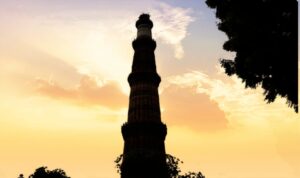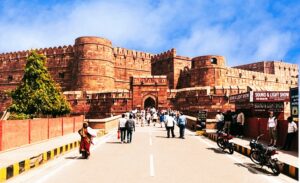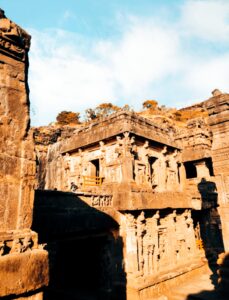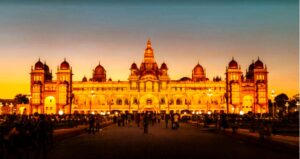Manashimaya
India, a land steeped in history and culture, boasts a wealth of architectural wonders that stand as testaments to its rich heritage. From the majestic forts to the intricately carved temples, each monument narrates a saga of the bygone era and reflects the diverse influences that have shaped the country over millennia.
Taj Mahal
Taj Mahal:
Perhaps the most iconic symbol of India, the Taj Mahal stands as a masterpiece of Mughal architecture. Built by Emperor Shah Jahan in memory of his beloved wife Mumtaz Mahal, this white marble mausoleum is a testament to love and eternal beauty. Its symmetrical design, intricate marble inlays, and lush gardens mesmerize millions of visitors every year, earning it the title of one of the New Seven Wonders of the World.

Red Fort
Red Fort:
Located in the heart of Delhi, the Red Fort is a splendid reminder of India’s imperial past. Built by Emperor Shah Jahan in the 17th century, this UNESCO World Heritage site is renowned for its massive red sandstone walls, intricate Mughal architecture, and sprawling gardens. The fort’s Diwan-i-Am (Hall of Public Audience) and Diwan-i-Khas (Hall of Private Audience) are architectural marvels adorned with exquisite carvings and inlay work.

Qutub Minar
Qutub Minar:
Standing tall amidst the ruins of ancient Delhi, the Qutub Minar is a towering symbol of India’s medieval history. Built by Qutb-ud-din Aibak, the first ruler of the Delhi Sultanate, in the 12th century, this UNESCO World Heritage site is the tallest brick minaret in the world. Its intricate carvings, Arabic inscriptions, and architectural brilliance make it a must-visit destination for history enthusiasts.

Khajuraho Group of Monuments
Khajuraho Group of Monuments:
Nestled amidst the forests of Madhya Pradesh, the Khajuraho Group of Monuments is renowned for its exquisite temples adorned with intricate sculptures and erotic art. Built between the 9th and 11th centuries by the Chandela dynasty, these UNESCO World Heritage sites showcase the architectural splendor and artistic prowess of ancient India. The temples, dedicated to Hindu deities like Vishnu and Shiva, are a celebration of love, spirituality, and human emotions.

Hampi
Hampi:
Once the glorious capital of the Vijayanagara Empire, Hampi is now a UNESCO World Heritage site dotted with majestic ruins, temples, and monuments. Located in the state of Karnataka, Hampi’s awe-inspiring landscape, including the iconic Virupaksha Temple, the Vittala Temple complex with its musical pillars, and the majestic Elephant Stables, transports visitors to a bygone era of grandeur and splendor.

Agra Fort
Agra Fort:
Another architectural gem in the city of Agra, the Agra Fort is a UNESCO World Heritage site that served as the main residence of the Mughal emperors until the capital shifted to Delhi. Built primarily of red sandstone, this massive fort complex houses exquisite palaces, mosques, and audience halls, each adorned with intricate carvings and marble work. The fort’s strategic location on the banks of the Yamuna River offers breathtaking views of the Taj Mahal.


Ajanta and Ellora Caves:
Carved into the rocky cliffs of Maharashtra, the Ajanta and Ellora Caves are a UNESCO World Heritage site renowned for their ancient Buddhist, Hindu, and Jain cave temples. These magnificent rock-cut structures, dating back to the 2nd century BCE, are adorned with stunning sculptures, frescoes, and architectural marvels that depict stories from Indian mythology and religious texts.

Konark Sun Temple (Odisha)
Konark Sun Temple (Odisha):
Dedicated to the Sun God Surya, the Konark Sun Temple is a UNESCO World Heritage site known for its intricate stone carvings and architectural brilliance. The temple is designed in the shape of a colossal chariot with wheels, drawn by seven horses.

Mysore Palace (Karnataka)
Mysore Palace (Karnataka):
Also known as the Amba Vilas Palace, the Mysore Palace is a magnificent royal residence that blends Indo-Saracenic, Rajput, and Gothic architectural styles. It is renowned for its grandeur, opulent interiors, and stunning lighting displays during festivals.

Victoria Memorial (Kolkata, West Bengal)
Victoria Memorial (Kolkata, West Bengal):
A symbol of the British Raj in India, the Victoria Memorial is a grand marble building dedicated to Queen Victoria. It houses a museum showcasing artifacts, paintings, and sculptures from the colonial era.
India’s monuments are not merely architectural marvels but living testaments to the country’s rich and diverse cultural heritage. From the towering minarets of Delhi to the serene temples of Hampi, each monument narrates a story of love, faith, power, and artistic brilliance, inviting visitors to embark on a journey through time and unravel the mysteries of India’s glorious past. As guardians of this invaluable heritage, it is our collective responsibility to preserve and cherish these monuments for generations to come, ensuring that they continue to inspire awe and admiration for centuries ahead.

